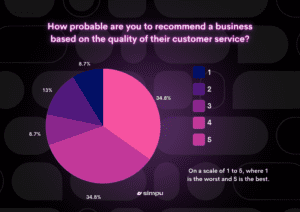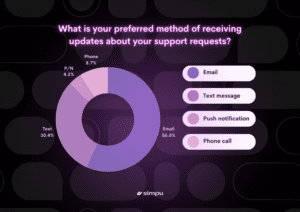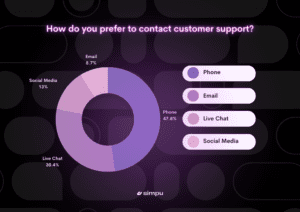In the recent landscape, the emergence of Gen Z as a formidable and influential demographic group has ushered in distinct preferences and expectations, prompting a shift across various industries.
The Evolution of Customer Service Landscape:
Customer service has perennially held a pivotal role within businesses, a linchpin for nurturing customer loyalty and satisfaction.
However, the customer service domain has experienced a profound metamorphosis, largely attributed to the entrance of a new generation of consumers.
Having grown up in a world entrenched in technology and accustomed to instant gratification, Gen Z demands a level of service that is faster, personalized, and supremely convenient.
In times past, customer service was often relegated to a necessary yet somewhat laborious business facet.
Yet, as competition intensified and consumer expectations soared, enterprises found themselves compelled to elevate their customer support game.

Today, the significance of customer service lies in its pivotal role as a catalyst for customer loyalty and advocacy. Businesses now channel substantial resources into crafting effective and streamlined support systems.
A recent survey underscored that Gen Z exhibits a higher inclination than any previous generation towards self-service avenues when seeking customer support.
Intriguingly, 60% of Gen Z respondents disclosed a preference for resolving their own issues via self-service mechanisms, such as FAQs or knowledge bases, prior to engaging with customer service representatives.
This burgeoning inclination has propelled the ascendancy of chatbots and other self-service tools, as businesses strive to align with the tech-savvy preferences of this generation.
The Profound Impact of Gen Z on Customer Service:
From the surge in self-service solutions to the growing reliance on social media for customer assistance, businesses have been forced to recalibrate their strategies to cater to the evolving needs of this tech-savvy and demanding demographic.
Gen Z’s Distinctive Expectations from Customer Service:
Gen Z’s expectations of customer service markedly diverge from those of preceding generations, underpinned by their unique value system.
They place a premium on swiftness, convenience, and customization in their interactions with customer support.

Rapid Response Time:
A staggering 57% of surveyed Gen Z participants articulated their anticipation of a customer service response within a 24-hour window or less, with an additional 27% expecting a reply within just a few hours.
This contrasts sharply with the more lenient timelines previous generations might have tolerated.
Omni-Channel Support:
Gen Z calls for customer service to be available across diverse communication channels, spanning social media, email, chat, and phone.
Interestingly, while 57% of Gen Z respondents favor email as a means to connect with customer support, 13% lean towards social media—a preference that highlights the continued importance of email in communication.
Personalized Interaction:
Personalization emerges as another cornerstone that differentiates Gen Z’s expectations.
An impressive 72% of Gen Z participants expressed a heightened likelihood of brand loyalty when their customer service interactions are personalized.
In essence, businesses are tasked with closely tailoring their support interactions to individual preferences and needs.
Shaping Gen Z’s Customer Service Expectations:
Gen Z’s specific expectations of customer service, characterized by the demands for speed, convenience, and personalization, are instrumental in steering businesses towards crafting tailored strategies.
Leveraging Social Media for Customer Service:
The profound influence of social media on customer service is indisputable.
A remarkable 90% of Gen Z survey respondents stipulated a business’s social media presence as an expectation, with 13% choosing to interact with customer service primarily through these platforms.
The impact of social media on customer service is dual-fold:
Accelerated Response Times: Platforms like Twitter and Facebook offer expedited and direct lines of communication, enabling near-instantaneous responses.
Enhanced Personalization: Social media allows businesses to engage customers on a personal level, addressing their specific concerns and requirements.
The survey unveiled that 71% of Gen Z respondents view brands more favorably when they receive personalized customer service via social media.
Embracing the Future of Customer Service:
As Gen Z’s influence reverberates through the customer service landscape, businesses are urged to proactively adapt and anticipate their evolving needs.
Survey data highlights two pivotal technological arenas that will mold the future of customer service: chatbots and customer engagement platforms.
Chatbots:
Chatbots, powered by artificial intelligence, enable automated customer interactions through messaging platforms and websites.
The survey ascertained that 31% of Gen Z respondents prefer using chatbots for customer support—an inclination indicative of the burgeoning acceptance of chatbot technology in this realm.
Customer Engagement Platforms:
Another emerging trend resides in the utilization of customer engagement platforms, which provide unified interfaces for managing customer interactions across various channels—social media, messaging apps, and email.

With 57% favoring email as a support updates channel and 31% opting for text, these platforms have the potential to streamline communication for immediate responses.
Concluding Thoughts:
Gen Z’s imprint on the customer service realm commands attention. With distinct preferences and elevated expectations—emphasizing speed, convenience, and personalization—Gen Z necessitates innovative adaptation from businesses.
Leveraging technologies such as chatbots and customer engagement platforms, while furnishing personalized and efficient service, will be pivotal.
Embracing a robust social media presence and agile response mechanisms are also critical components for success. Enterprises adept at meeting Gen Z’s demands are poised to forge enduring bonds with this influential demographic, ensuring their relevance in a landscape dominated by Gen Z consumers.
No related posts.






